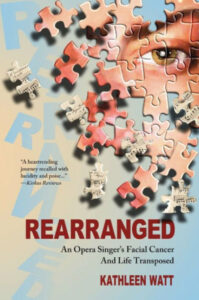Rearranged
An Opera Singer’s Facial Cancer and Life Transposed
By Kathleen Watt,
Heliotrope Books, New York 2023
by David J. Elpern, M.D.
Full many a gem of purest ray serene
The dark unfathomed caves of ocean bear;
Full many a flower is born to blush unseen
And waste its sweetness on the desert air.
T. Gray, Elegy Written in a Country Churchyard

Would this not be the fate of Kathleen Watt’s riveting and important pathography. The topic is her decade-long odyssey of treatment for, and recovery from, osteogenic sarcoma of the jaw.
As a physician, I have found that textbooks are of limited value. They are essential, but take one just so far. They tell us about the disease, but not about the person with the disease. It is a truism that it is often more important to treat the person with the disease than it is to treat the disease the person has. Our job as physicians is to work with the patient to craft a treatment for the problem that suits the individual with that problem.
Kathleen Watt was an aspiring opera singer when she was diagnosed with a malignant tumor of the maxilla. Originally thought to be a chondrosarcoma, eventually it was reclassified as an even more dangerous osteogenic sarcoma (OS), a tumor with an incidence of < 1 per million in adults.
Watt is a gifted story-teller who tells her story with humor and insight. There are many lessons for physicians, patients and caregivers in Rearranged. Her medical/surgical team was gifted, but human, too. Their sometimes messy personal and professional lives impacted patient care. She suffered surgical complications and major upheavals in her private life. Watt is candid about her own life and that of her long-term partner, Evie. Rearranged is much more than a story about a tumor. We learn about Watt’s personal relationships and how they were impacted by years of disease and some hapless life choices. We learn how important it is for patients to have functioning support systems.
Physicians’ Continuing Medical Education (CME) is heavily weighted towards the technical, towards what can be measured. Perhaps, that’s because the editors of prestigious journals and medical teachers suffer from their own brand of tunnel vision. We need open-ended narratives such as Rearranged to supplement our narrow professional educations.
For instance, in dealing with her cadre of physicians, we need instructors such as Kathleen Watt to tell us:
New doctors are specifically and exhaustively trained to repress natural impulses, like sympathy with the humans in their care. Such impulses are referred to as “humane bias,” and a young doctor’s objective is to master it, effectively severing emotion from executive function. Human bias only makes a muddle of the physician’s clear eyed observations.Over the past three decades, I have studied illness-narratives (pathographies) and collected many of them on a website. There are common themes that run through pathographies and they fall into one, or a combination of, three narratives: Quest, Chaos or Restitution. Watt’s narrative encompasses all three. I felt privileged to have taken a master class in patient care from Kathleen Watt.
Rather than blather on, you can visit a document containing some excerpts I took from Rearranged. If you want to open this link and can’t, email me and I’ll send the link. djelpern@gmail.com
Having finished Ms. Watt’s brilliant, convoluted journey, I feel like the wedding guest in Coleridge’s “Ancient Mariner.”
He holds him with his glittering eye—
The Wedding-Guest stood still,
And listens like a three years’ child:
The Mariner hath his will.
Addendum:
There are similar books dealing with the effects of facial tumors and trauma.
1. Autobiography of a Face by Lucy Grealy (1994)
2. The Facemaker: A Visionary Surgeon’s Battle to Mend the Disfigured Soldiers of World War I by: Lindsey Fitzharris (2022)
3. Truth & Beauty: A Friendship by Ann Patchett (2004)
